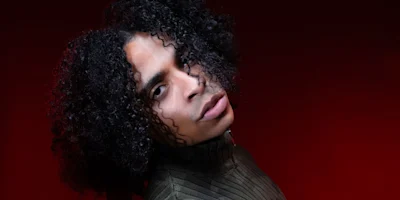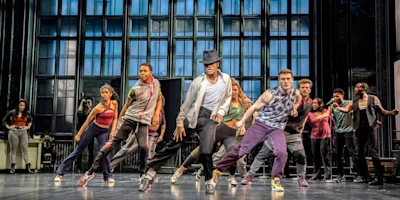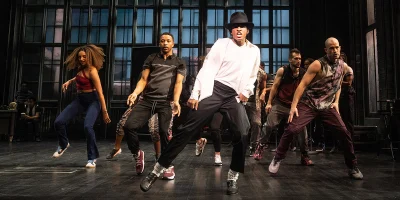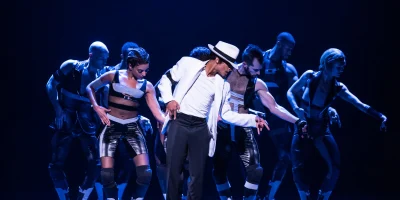
A complete guide to all the songs in 'MJ the Musical'
Learn more about the songs in MJ the Musical, including some of the King of Pop's most iconic tracks such as "Billie Jean," "Thriller," and "Smooth Criminal."
Acclaimed biographical jukebox musical MJ the Musical features over 25 of Michael Jackson’s greatest hits.
Set during Jackson’s Dangerous World Tour of 1992, the show features numbers from his childhood appearances with his brothers in The Jackson 5; his early solo success; his legendary Thriller, Bad, and Dangerous albums; as well as some songs from his later career.
The musical opened on Broadway in December 2021, after delays due to the Covid-19 pandemic. Myles Frost, who originated the role on Broadway and won a Tony Award for his performance, crossed the pond to reprise the role in the West End. The part is now played by Jamaal Fields-Green — the only performer to take on the role on Boradway, in the West End, and as part of the US national tour. You can listen to the Broadway cast album, which was nominated for a Grammy for Best Musical Theatre Album.
Book MJ the Musical tickets on London Theatre.
“Beat It” (1982)
The musical kicks off with the rock number on Jackson’s Thriller album, which is a banger with a social message. The song is thought to have been inspired by the Jackson family’s experiences of witnessing gang activity in their hometown of Gary, Indiana ("They're out to get you, better leave while you can / Don't wanna be a boy, you wanna be a man.") The music video was notable for its depiction of Black youth culture, depicting two rival gangs who reconcile through the power of music. The song positioned Jackson as a Black artist playing an important role in race relations.
Jackson 5 Medley: “The Love You Save” / "I Want You Back” / "ABC”) (1970/1969/1970)
A trio of upbeat numbers performed by Little Michael with his brothers Marlon, Jermaine, Tito, and Jackie as The Jackson 5. The Jackson 5 was managed by Jackson patriarch Joe and it was one of the Black groups to enter mainstream pop culture. "The Love You Save" features witty references to historical figures, including Isaac Newton, Benjamin Franklin, and Christopher Columbus. The infectiously catchy "I Want You Back" marked the first time 11-year-old Michael performed lead vocals. "ABC" compares learning about love with learning the alphabet.
“I’ll Be There” (1970)
The first single released from The Jackson 5’s third album has a slow tempo, which showcased pre-teen Michael’s maturity and demonstrated the group could sing ballads as well as upbeat pop songs. In MJ, it’s a tender moment performed as a trio by Little Michael, MJ, and Jackson matriarch Katherine.
“Don’t Stop ‘Til You Get Enough” / "Blame It on the Boogie” / "Dancing Machine” (1979/1978/1974)
"Don’t Stop ‘Til You Get Enough" was Jackson’s second number-one solo hit and introduced his falsetto voice and signature vocal ‘hiccups’ (his mother was concerned it was too suggestive and he assured her it could be about whatever you want). ‘Blame It on the Boogie’ was written by Mick Jackson (no relation) and performed by The Jacksons, as the group was renamed in 1975. "Dancing Machine" popularised the ‘robot’ street dance technique. The medley is performed by MJ and Teenage Michael with the Jackson brothers.
“Stranger in Moscow” (1995)
Jackson long had a fraught relationship with the press. In 1993, he was accused of child sexual abuse. He cancelled the rest of his Dangerous World Tour. This song, from his HIStory album, explores fear and isolation using the Russian capital as a metaphor.
“You Can’t Win” (1978)
In 1978, Jackson played Scarecrow in the movie musical The Wiz, an urbanised and politically charged update of The Wizard of Oz performed by an all-Black cast. "You Can’t Win" was released as a single the year after. In The Wiz, a murder of crows attempt to undermine Scarecrow’s confidence and intellectual prowess. In MJ, it’s performed by Teenage Michael and Motown record label founder Berry Gordy.
“I Can’t Help It” (1979)
Written by Stevie Wonder and taken from Off the Wall, his first album produced by Quincy Jones, this self-reflective and dream-like number is performed in the show by Teenage Michael, as he explores his identity and burgeoning romantic prospects.
“Keep the Faith” (1991)
From Jackson’s 1991 Dangerous album; in the show, Jones sings this gospel-infused song to Teenage Michael.
“Wanna Be Startin’ Somethin’” (1982)
The opening track of Jackson’s Thriller album, a frantic post-disco funk number about strangers starting rumours in order to instigate an argument.
“Earth Song” / "They Don’t Care About Us” (1995/1996)
Act I ends with two songs from Jackson’s controversial HIStory album. "Earth Song" promoted an environmentalist message through a Christian perspective. "They Don’t Care About Us" is a protest song, notorious for its original antisemitic lyrics (Jackson argued against these allegations). The Dangerous World Tour raised funds for Jackson’s Heal the World Foundation.
“Billie Jean” (1983)
A narrative song about a woman called Billie Jean, who alleges that the narrator is the father of her baby son. The song was inspired by Jackson’s experiences of touring with his older brothers, encountering followers who would make such claims, as well as letters that he received from disturbed fans. It was Jackson’s fastest-rising number-one single since his work with The Jackson 5.
“Smooth Criminal” (1987)
From the album Bad, telling the story about a woman who is attacked in her home by a ‘smooth criminal’. A turning point in Jackson’s move towards darker material, the song was the key number in Jackson’s 1988 experimental musical anthology film Moonwalker, in which he paid homage to Fred Astaire in The Band Wagon.
“For the Love of Money” / "Can You Feel It” (1973 / 1981)
Jackson patriarch and manager Joe is joined by his sons for non-Jackson song "For the Love of Money," originally performed by soul group the O’Jays. "Can You Feel It" was written by Michael and Jackie.
“Keep the Faith” (reprise) (1991)
Reprise of the gospel number sung by MJ and tour manager Rob.
“She’s Out of My Life” (1980)
One of Jackson’s slowest songs, this is an emotive ballad about a bad breakup with a girlfriend the narrator had previously taken for granted. The song was originally intended for Frank Sinatra.
“Jam” (1992)
The opening track on Dangerous. “Nation to nation, all the world must come together:” in the music video, Jackson taught basketball star Michael Jordan how to dance and Jordan taught Jackson how to play basketball.
“Human Nature” (1983)
A gentle and lyrical song, inspired by random encounters in New York City.
“Bad” / "2 Bad” (1987)
Like "Smooth Criminal," "Bad" was part of Jackson’s transition towards edgier material. The song was inspired by details of a story of a boy from a poor neighbourhood, who had a chance to attend a private school but was killed by his former friends when he returned for the holidays. The video was inspired by West Side Story, plus moonwalking.
“Thriller” (1983)
Perhaps Jackson’s most famous song and the title track of the best-selling album of all time. Evoking classic horror movies, the music video, in which Jackson dances with zombies, is similarly iconic. MJ, Little Michael and Joe come together in a number of sheer spectacle.
“The Man in the Mirror” (1988)
Performed with a gospel choir, “The Man in the Mirror” is a heartfelt manifesto advocating for personal and social change: “I'm starting with the man in the mirror / I'm asking him to change his ways / And no message could have been any clearer / If you wanna make the world a better place / Take a look at yourself and then make a change.” The inspirational lyrics bring the company together.
“Jam” (reprise) / "Black and White” / "Wanna Be Startin’ Something” (1992/1991/1983)
The finale: a reprise of “Jam;” a rendition of “Black and White,” a call for racial harmony; followed by a reprise of “Wanna Be Startin’ Something.”
Other songs
“Tabloid Junkie” / "The Price of Fame” performed by MJ and Rachel, a reporter; a medley of “Shout” / "Papa’s Got a Brand New Bag” and “(Your Love Keeps Lifting Me) Higher and Higher” performed by the ensemble; Rodgers and Hammerstein’s “Climb Ev’ry Mountain” sung by Little Michael; “Money” sung by Joe – and don’t miss “Workin’ Night and Day” performed by the orchestra at the end of the show.
Book MJ the Musical tickets on London Theatre.
Photo credit: MJ the Musical on Broadway. (Photo courtesy of production)
Frequently asked questions
What is MJ The Musical about?
Step into the world of the musical icon MJ The Musical. Featuring over 25 of Michael Jackson's greatest hits, this electrifying show takes you on a journey through his legendary career. From "Thriller" to "Billie Jean," experience the music, the moves, and the magic that made Michael Jackson an icon. Don't miss the ultimate celebration of his extraordinary legacy.
Where is MJ The Musical playing?
MJ The Musical is playing at Prince Edward Theatre. The theatre is located at 28 Old Compton Street, London, W1D 4HS.
How long is MJ The Musical?
The running time of MJ The Musical is 2hr 35min. Incl. interval.
What's the age requirement for MJ The Musical?
The recommended age for MJ The Musical is Ages 8+. Under 16s must be accompanied and sat next to an adult (18+). Everyone must have their own ticket. Under 3s will not be admitted. .
How do you book tickets for MJ The Musical?
Book tickets for MJ The Musical on London Theatre.
Who wrote MJ the Musical?
Lynn Nottage, a two-time Pultizer Prize-winning playwright for Sweat and Ruined, wrote the book for MJ The Musical. Most of the songs are by Michael Jackson, but the show also incorporates other hits from his time period by other musicians.
What are the songs in MJ the Musical?
MJ The Musical is a jukebox musical, featuring the music of Michael Jackson, The Jackson 5, and more. There are 35 songs in this show and 25 of them are well-loved Jackson hits, including “Thriller,” “Billie Jean,” “Bad,” “Beat It,” and “Man in the Mirror.”
Who directed MJ the Musical?
Christopher Wheeldon directed and choreographed MJ The Musical. Wheeldon's outstanding work earned him a Tony Award for Best Choreography and a nomination for Best Director of a Musical. He previously won a Tony Award for Best Choreography for An American In Paris.
Is MJ the Musical appropriate for kids?
MJ The Musical offers an engaging and family-friendly experience for kids over the age of 8. Kids watching the show will be enthralled by the iconic songs, dazzling choreography, and colorful stagecraft.
Is MJ the Musical good?
MJ The Musical is a captivating celebration of Michael Jackson's unparalleled musical legacy. Audiences are treated to an electrifying journey through his life and career, complete with renditions of his greatest hits and iconic dance sequences. This production is a dedication to his artistry, making it a must-see for his fans.
Originally published on






